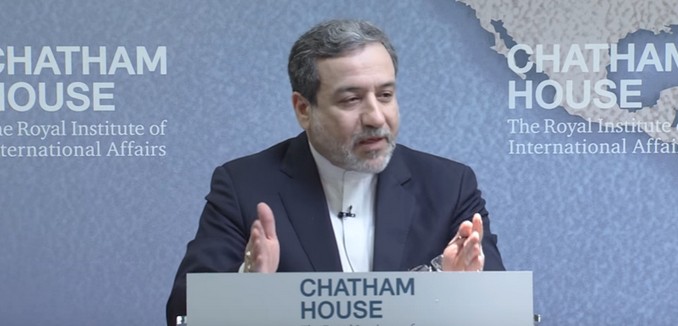This week, Iran’s Deputy Foreign Minister Abbas Araqchi charged that the 2015 nuclear deal that his nation concluded with six major powers “has no benefit for us,” and threatened that Iran would leave the deal. Araqchi explained that Iran wasn’t enjoying the full benefits of the deal because banks were not doing business with Iran due to uncertainty over the future of the deal, following President Donald Trump’s announcement last month that he would no longer waive nuclear sanctions Iran until the flaws in the deal were fixed.
Congress and the other parties to the deal have until May to end the sunset clauses in the deal that would allow Iran to develop an industrial nuclear program in less that 15 years, prevent Iran from any more missile development, force Iran to open its military sites to inspections and pursue Iran for human rights violations and terror support.
To hear Araqchi’s complaint in isolation, it appears that Trump has imposed a new hardship on Iran. But the Islamic Republic has been playing the game since the nuclear deal was agreed to in July 2015. Even when President Barack Obama was still in office, Iran accused the United States of not living up to the terms of the nuclear deal.
In December 2015, Congress passed and Obama signed a bill that would exclude certain countries from the Visa Waiver Program, which allowed nationals of many nations to have visas to enter the U.S. granted automatically. Iran, which the State Department has determined is the leading state sponsor of terror in the world, was one of the countries excluded.
Iranian Foreign Minister Mohammad Javad Zarif complained that by requiring Iranians or those who had traveled to Iran to go through the regular visa application process constituted a restriction on travel, and therefore a violation of the United States’ commitment not to impose new sanctions on Iran. In response to Zarif’s complaint, the Obama administration agreed that the State Department could hand out visa waivers to visitors from Iran.
Zarif’s threat that Iran would treat a non-nuclear issue as a breach of the nuclear deal intimidated the Obama administration into undermining a law that the president himself had signed.
In June 2016, Sen. Chris Coons (D – Del.), who had supported the nuclear deal, criticized then Secretary of State John Kerry’s efforts to drum up business for Iran in Europe in light of complaints from Iran that the received sanctions relief was inadequate. Coons said, “It is Iran’s challenge to demonstrate that their economy is transparent enough, legitimate enough, secure enough, to attract foreign investment. I don’t think it’s our job to act as the chamber of commerce for Tehran,” referring to sanctions imposed on Iran for its money laundering and terror finance, which predated the nuclear sanctions.
During the Obama administration, just as now, Iran complained that the U.S. was preventing from receiving the full measure of sanctions relief that it was due.
Araqchi’s effort to blame the Trump administration comes at a time when an increasing number of people are realizing how bad the consequences of the nuclear deal have been, even among those who supported it originally.
Joshua Keating, a foreign policy expert for Slate, earlier this month, published a reconsideration of the deal which he once “fully supported,” writing, “in order to address a terrifying but hypothetical danger—an Iranian nuke—the Obama administration’s foreign policy accepted a real and catastrophic one.”
A New York Times editorial this week acknowledged that a legal case should be built against Syrian President Bashar al-Assad for committing war crimes. The editorial added that a case should also be made against “Russian leaders, who help keep Mr. Assad in power with political support and military air assets, and Iranian leaders, who provide tactical advice and ground troops.” Implicitly the Times, which avidly backed the deal, was admitting that Iran rather than being constrained by the nuclear deal was emboldened to pursue its hegemonic aims even more aggressively in its wake.
Araqchi is attempting to change the subject. He arguing for his nation that if the deal falls apart it will be Trump’s fault.
But, in January, the United Nations found that Iran was violating UN-imposed restrictions against sending arms to the Houthi rebels in Yemen. This, by the way, is also a violation of UN Security Council 2231 which not only endorsed the nuclear deal, but also prohibited Iran from exporting any weapons, including ballistic missiles. By standards set out by Zarif three years ago, this means that Iran is in violation of the nuclear deal.
Now that the world is recognizing the destruction that was unleashed by releasing Iran from the penalties imposed on it for repeated defiance of the UN Security Council, it is time to heed Trump’s call and fix the nuclear deal. Or to re-impose sanctions and make Iran pay for its refusal to abide by international law.
Do not let Iran change the subject.
[Photo: Chatham House / YouTube]




